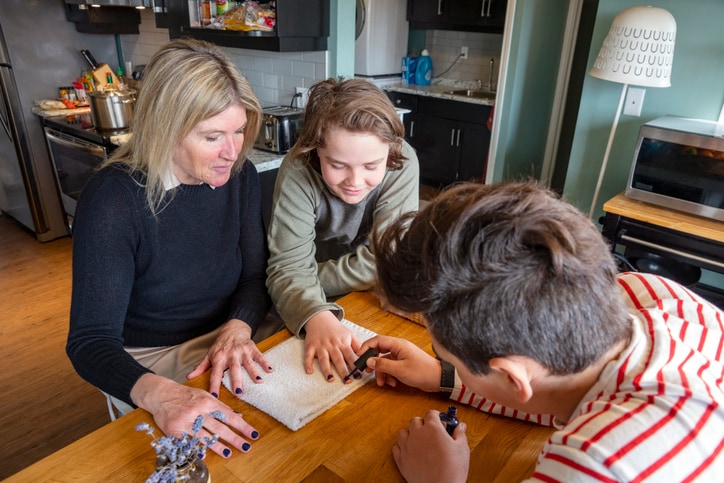Whether you’re a working parent or a mom or dad looking to go on the odd date night, finding a good babysitter can feel like winning the lottery. But just because someone interviewed well and hit it off with the kids at their first meeting, he or she isn’t necessarily a keeper.
“Hiring the right caregiver for your family is the easy part,” says Michelle LaRowe, founder of NannyTraining.com, former director of the International Nanny Association and author of “Nanny to the Rescue!” “It’s monitoring the quality of the in-home care your child is receiving that’s more of a challenge.”
In order to make sure your kids are in the best care possible when you’re not around, consider the red flags top experts say parents should look for when hiring a sitter.
1. Your child doesn’t look cared for when you return
While it’s perfectly OK to find kids sporting a little dirt from the back yard or paint from an art project when you return, they should generally appear comfortable, clean and well-cared for.
“Returning home to a child who hasn’t been changed in a while, who has unexplained bumps or bruises or who’s hungry can all be signs of a poor child care provider, or worse, it could be a sign of babysitter abuse,” says LaRowe, who always advises parents specify exact expectations and rules on paper before leaving. (More on that in a bit.)
If you’re not sure whether or not you should be alarmed by the scraped knee or soiled diaper you came home to, here are a few signs of potential child abuse, according to Boston Children’s Hospital:
-
Unexplained injuries, such as bruises and burns. Explanations about injuries should always make sense.
-
Recurrent injuries.
-
Unusual behavior or remarks from children, such as talking about sexual acts.
If you still have concerns, check out the Care.com Safety Center for more tips and advice.
2. Your child doesn’t react positively when the sitter arrives
Does your child seem happy to see the nanny when he or she arrives? If she whines at first but then warms up after 15 minutes or so while you’re there (and then again when you leave), it’s not cause for concern, says Ruthie Arbit, a psychotherapist who specializes in maternal and pediatric mental health.
“You want your child to show comfort in your presence while the nanny is there,” says Arbit.
It’s important to keep your child’s individual temperament in mind.
“When looking at behavioral signs in your child, remember, you know them best,” says Arbit. “Is your kiddo very quick to warm up or very slow? Does your child often complain about new situations, but then enjoys them? If he or she is acting completely out of character, it could be a red flag.”
And on the flip side, don’t forget about your habits.
“Are you generally a distrustful person?” Arbit says. “Do you often second guess the safety of loved ones? Knowing your own general tendencies can also be helpful when trying to distinguish harm or danger from apprehension.”
3. Your child’s temperament seems off when you come home
Your child is extra wired — or extra exhausted — when you get home.
“You know your child’s tendencies and nuances best, so it’s important to try to distinguish why your child is acting the way he is when you return,” says Arbit. “If he’s really tired, is it because he’s exhausted from all the activities or because he didn’t nap? If he’s really energetic, is it because the nanny hasn’t stimulated him all day? These are all signs of general maintenance to which the sitter should be tending.”
“When my toddler first started protesting naps on weekends, I thought it was unusual,” says Karen Lukasik, a mom of two from Hempstead, New York. “But then he told me that sometimes, when he doesn’t want to go to sleep, the nanny lets him watch TV with her. It all clicked! That’s why he had been so crazy when I got home from work sometimes. I spoke to the sitter, and they both know now that that’s not an option.”
4. You’re dealing with a lack of communication
Not getting a response when you text the sitter? Can barely coax any details out of her when you get home? Not only can “vague reporting” be a red flag, but it’s a big pet peeve for most parents, according to LaRowe.
“I stopped using my sitter when, after a few times, she barely told me what happened while I was gone,” says Laura Reilly, a mom of three from Los Angeles. “Anytime I asked her how it went, she just said ‘fine.’ ‘Really?’ I would think. ‘I was gone for two hours. Surely, something must have happened.’”
5. Your sitter seems indifferent to parental instructions or concerns
In addition to going off of what your child reports, which sometimes needs to be taken with a grain of salt, LaRowe says the following signs may point to a sitter failing to do as you ask:
-
Returning home to a child who is awake and playing when it’s several hours after his bedtime.
-
Returning home to a child who hasn’t been bathed, even though bath time was part of the care instructions.
-
Finding untouched food in the fridge that you asked to be served to your child.
-
Entries in the provider’s log (if you left one) that do not match up with the instructions provided.
“To help ensure instructions are followed, parents should provide written directions, rather than oral,” says LaRowe. “Oral instructions provided to the caregiver in the chaos that sometimes ensues during the transition between parent and provider can be lost in translation.”
6. Your child is exhibiting regressions and unusual behavior
If you have an anxious child, regressions such as night waking or potty accidents aren’t uncommon in new situations and routines. But for parents whose kids haven’t previously demonstrated this behavior, it’s worth exploring further.
According to Arbit, the following are cues your child may be anxious due to a babysitter:
-
Abrupt regressions with food, potty, sleep and general behavior.
-
Increased moodiness.
-
Fearfulness.
-
Jumping suddenly.
-
Clinginess.
-
Crying way more often than usual.
“If you’ve never seen behavior like this in your child before, start asking questions,” says Arbit. “Inquire with your child about what they do all day with the sitter, what they play, if they have fun.”
If the sitter’s actions or caretaking style seems problematic, Arbit advises staying at home when he or she is there to see the situation firsthand.
“I always recommend that families with concerns stick around the house for a few hours to observe child-nanny interactions, train the nanny and get comfortable with the situation,” Arbit says. “You can also speak directly to the nanny and work together to problem-solve difficult behaviors. If this still doesn’t help, it may be worth considering a different route.”
7. You just have a gut feeling
Even if your sitter has ticked all the boxes off on paper, your intuition and parental instinct still is one of the best ways to gauge the situation.
“In addition to properly screening a caregiver and monitoring the quality of care children receive, parents should never disregard their gut feeling about a provider,” says LaRowe. “If something doesn’t feel right, it probably isn’t.”
That said, if you tend to err on the side of anxious, it may be worth getting a second opinion.
“While it’s important to trust your gut, you also need to ‘know thyself,’” Arbit says. “If you’re someone whose gut is always screaming ‘danger,’ have someone else weigh in. Ask a spouse, family member or friend to either meet the nanny in person or to do an observation of the sitter out and about, if you know where she takes the kids at certain times.”
If you still can’t make up your mind about your sitter, Arbit suggests either doing a surprise visit yourself or exploring the option of installing a camera. (Just keep in mind: There are laws about nanny cams!)
“Again, though, check in with yourself,” Arbit says. “If you’re a first-time parent and you can’t trust someone in your home, a day care with a video camera may feel more comfortable.”






